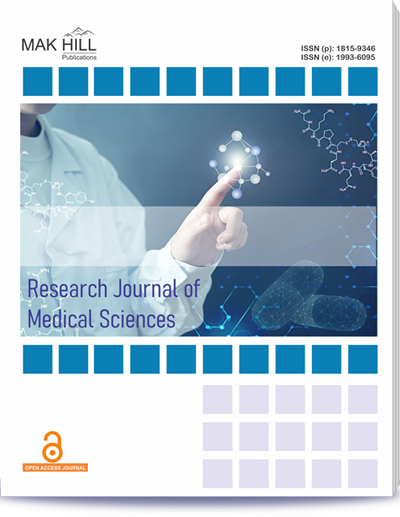
Research Journal of Medical Sciences
ISSN: Online 1993-6095ISSN: Print 1815-9346
175
Views
19
Downloads
Evaluation of Serum Neuron Specific Enolase as a Prognostic Marker for Short Term Outcome in the Patients with Closed Traumatic Brain Injury
Gian Chand, Vineet Tanwar, Biplav Singh and Digvijay Singh Thakur
Page: 7-14 | Received 20 Nov 2023, Published online: 04 Jan 2024
Full Text Reference XML File PDF File
Abstract
Several studies have suggested increased Neuron‐Specific Enolase (NSE) concentrations in blood following Traumatic Brain Injury (TBI), indicating a potential clinical role as a biomarker of the head injury. With this background, present study was done to estimate the levels of serum cleaved NSE as a diagnostic tool in patients with traumatic brain injury (TBI) and to correlate their outcome with other clinical parameters. In our study, twenty four patients of closed TBI were admitted in the Neurosurgery department at Trauma Centre and Surgical Superspeciality Hospital, Institute of Medical Sciences, Banaras Hindu University, Varanasi, between August 2016 and July 2017 were enrolled. NSE levels of the patient’s blood samples were determined and compared with those healthy controls. The data was statistically analyzed to determine their significance using SPSS software version 16.0. Majority of the patients in our study group i.e. 13 patients (54.17%) belonged to younger age group (up to 45 years) and were males (79.17%) The mean NSE levels of the study group was elevated in all three consecutive days with mean NSE level 50.96+19.59 mg LG1 on Day one (D1), 45.71+17.98 mg LG1 on Day three (D3) and 52.29+24.91mg LG1 on Day Five (D5). Mean NSE levels in patient’s upto 45 years of age appeared to be higher compared to those with age above 45 years. Mean NSE levels in serum of females were lower than that of males on the all three days but the difference was statistically insignificant and only a matter of chance. Mean NSE levels in severe TBI patients were significantly elevated in comparison to the patients with mild TBI. The difference was statistically significant with p<0.001. When comparison of mean NSE levels in patients with different modality of treatment was done the NSE levels were higher in patients undergoing surgical treatment than those patients kept on conservative management but difference proved to be of no statistically significance. Neuron specific enolase can serve as a potential marker for diagnosis and prognosis in patients with mild to severe TBI. It may yield better prognostic information when combined with clinical examination and CT scan of the patients.
How to cite this article:
Gian Chand, Vineet Tanwar, Biplav Singh and Digvijay Singh Thakur. Evaluation of Serum Neuron Specific Enolase as a Prognostic Marker for Short Term Outcome in the
Patients with Closed Traumatic Brain Injury.
DOI: https://doi.org/10.36478/10.36478/makrjms.2024.4.7.14
URL: https://www.makhillpublications.co/view-article/1815-9346/10.36478/makrjms.2024.4.7.14